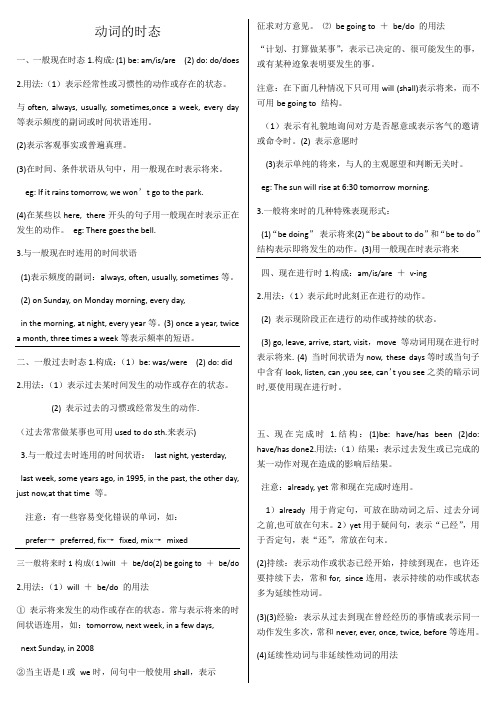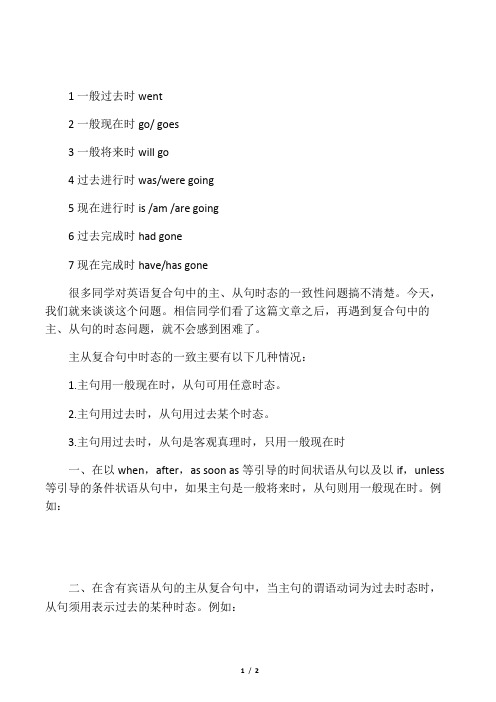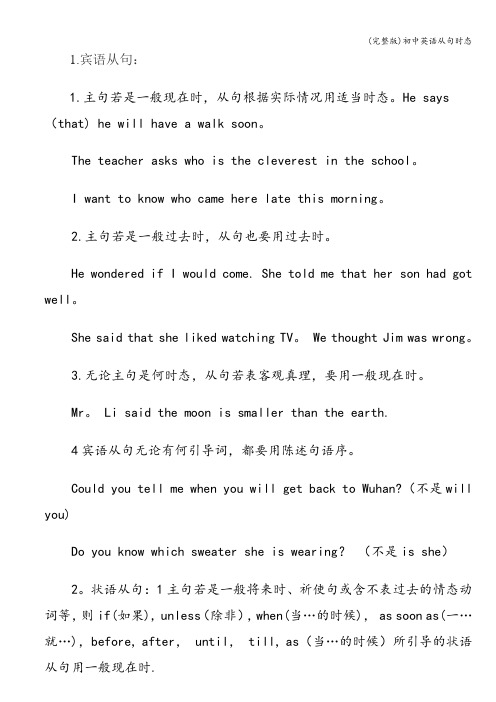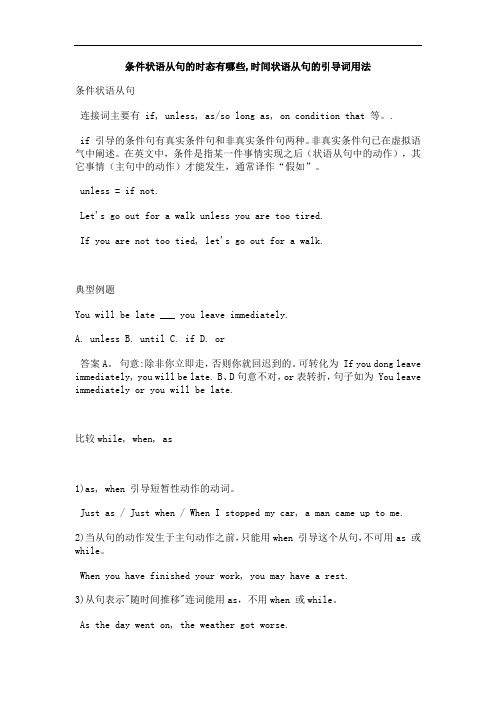初中英语从句时态
初中英语语法时间状语从句

他家,他都出去了。
时间状语从句
4>.表示持续性或瞬间性 主要连词有:since(自从),ever since(自从),until(直到…
才),till(直到…才、为止) 常用句型:it is/was…since… It is just a week since we arrived here.我们到这儿正好一个
时间状语从句
1>.表示同性时,既主从句的谓语动作同时发生或几乎 同时发生。
其连词有:when(当…的时候),while(当…的时 候),as(当…的时候),once(一旦…),as soon as(一… 就…),the time(当…的时刻),the monent(当…的时刻), by the time(到…时候为止),next time(下次),the first time(第一次…的时候),the last time(上次…的时候), immediately(一…就…),instantly(一…就…), directly(一…就…),以下关联词引起的句子中,前面 常用过去完成时,后面用一般过去时, hardly/scarcely…when…(刚…就…),no sooner…than…(刚…就…)。
时间状语从句
(2)it is/was/will be…before… 要过多久才…… It isn’t/wasn’t/won’t be…before… 没有过多久
就…… It will be another five days before we finish this task.还要
孩子睡觉了以后她开始备课。(从句的动作发生在 从句的动作之前,所以从句用了过去完成时)
【初中英语】初中英语语法大全之状语从句时态类型

【初中英语】初中英语语法大全之状语从句时态类型
【—之状语从句时态类型】下面是老师为同学们带来的对状语从句的时态说明及常态类型,供同学们参考。
1、时态说明
1)在时间和条件状语从句中,通常必须用通常现在时则表示将来意义,而无法轻易采用将来时态:
iwon’tgoifitrainstomorrow.要是明天下雨,我就不去。
(不能用willrain)
2)有时也可以看见ifyouwill这样的观点,但那不是将来时态,而是则表示意愿或直截了当的命令(此时的will就是情态动词):
ifyouwillwaitamoment,i’llfetchthemoney.请等一下,我就去拿钱。
2、常用类型
状语从句即指在主从复合句中用作状语的从句。
状语从句根据其用途可分为时间状语从句、地点状语从句、原因状语从句、结果状语从句、目的状语从句、条件状语从句、方式状语从句等:
hewasangrybecauseiwaslate.他很生气因为我耽误了。
(原因状语从句) hewassoangrythathecouldn’tspeak.他气得话都说不出来。
(结果状语从句)
althoughheispoor,he’shappy.虽然愁,但他仍很欢乐。
(妥协状语从句)
putitwhereyoucanreachit.把它放在你可以拿到的地方。
(地点状语从句)
speakclearlysothattheymayunderstandyou.讲清楚些,以便他们能够认知你。
(目的状语从句)
对于上述老师为同学们带来的这些,同学们都懂了吗?如果还有不懂的可以参考!。
初中英语时态定语从句宾语从句

动词的时态一、一般现在时态1.构成: (1) be: am/is/are (2) do: do/does2.用法:(1)表示经常性或习惯性的动作或存在的状态。
与often, always, usually, sometimes,once a week, every day 等表示频度的副词或时间状语连用。
(2)表示客观事实或普遍真理。
(3)在时间、条件状语从句中,用一般现在时表示将来。
eg: If it rains tomorrow, we won’t go to the park.(4)在某些以here, there开头的句子用一般现在时表示正在发生的动作。
eg: There goes the bell.3.与一般现在时连用的时间状语(1)表示频度的副词:always, often, usually, sometimes等。
(2) on Sunday, on Monday morning, every day,in the morning, at night, every year等。
(3) once a year, twice a month, three times a week等表示频率的短语。
二、一般过去时态1.构成:(1)be: was/were (2) do: did2.用法:(1)表示过去某时间发生的动作或存在的状态。
(2) 表示过去的习惯或经常发生的动作.(过去常常做某事也可用used to do sth.来表示)3.与一般过去时连用的时间状语:last night, yesterday,last week, some years ago, in 1995, in the past, the other day, just now,at that time 等。
注意:有一些容易变化错误的单词,如:prefer→preferred, fix→fixed, mix→mixed三一般将来时1构成(1)will +be/do(2) be going to +be/do2.用法:(1)will +be/do 的用法①表示将来发生的动作或存在的状态。
初中英语主句从句时态关系例句

初中英语主句从句时态关系例句宾语从句中,从句谓语动词的时态要与主句谓语动词的时态相呼应,主要体现在三个方面:1.主句的谓语动词是一般将来时、一般现在时或主句是祈使句时,从句的谓语动词根据实际情况选用具体的时态。
例如:It’s reported that Nanjing South Railway Station at the end of this month. (2011南京)A.has been completedB.is completedC.was completedD.will be completed此题中,从句的时间状语表示将来at the end of this month,主句又为现在时,故从句用将来时。
2.主句的谓语动词是一般过去时,从句的时态要相应地使用与过去相对应的时态,即一般将来时与过去将来时,一般现在时与一般过去时,现在完成时与过去完成时相对应。
例如:The woman asked the policeman where__.(2011重庆)A.the post officeB.the post office wasC.is the post officeD.was the post office 这道考题中,主句动词时态用了过去时,故从句应由原来的一般现在时改为一般过去时。
另外,有必要注意两个特殊的词would和could,它们常出现在中考题中。
would和could 经常用于表示客气、委婉的语气,不表示过去,从句时态应根据实际情况而定。
例如:(1)—Excuse me,I want to go to the 21st National BookExpo(展览会).Could you tell me__?—Sure.It is at No.3 Changjiang Road in Harbin.(2011哈尔滨)A.where it isB.where it wasC.where is it(2)—Would you please tell me__?—At 10:00 this evening.(2010福建晋江)A.when will the train leaveB.when the train will leaveC.when does the train leave3.如果从句反映的是科学事实、客观真理、名言警句时,时态一律都是一般现在时,不管主句用什么时态。
初中英语重点语法三大从句总结

初中英语重点语法三大从句总结初中英语中,主要有三大从句,即宾语从句、定语从句、状语从句(包括时间、条件、结果、目的、原因、让步、地点、方式等)。
1宾语从句在句子中起宾语作用的从句叫做宾语从句。
that: I think that you can pass the exam. Whether/if: I don’t know what the word means. “Wh”: I don’t know what the word means.I don’t know where he found the book.只用whether的情况:1. 与or not连用:I don’t know whether it’s raining or not.2. 与动词不定式连用:He doesn’t know whether to accept the invitation.3. 连接词前有介词时:It depends on whether he is coming.1. 主句是一般现在时态,从句根据实际情况而定(各种时态均可)She wants to know what he has done for the exam.2.主句是一般过去时态,从句用相应的过去的时态。
1)She said that she was a student.2)She said that she would fly to Japan in a week. 3)She said that she had finished her homework already.3. 如果宾语从句说的是客观真理、自然现象或事实时,这时宾语从句要用一般现在时态。
The teacher said that the earth goes round the sun.2定语从句在复合句中修饰名词、代词的从句叫定语从句。
先行词指人 who /that先行词指物 which/ that定语从句一般紧跟被修饰的名词或代词(即先行词)后关系代词代替先行词在句子中担当成分,所以从句中不可再出现其他代替先行词的代词Whom: 先行词指人,则代替先行词在定语从句中充当宾语(包括介词的宾语), 与who的区别是如果前面带介词则必须用whom1. This is the teacher whomwho we like best.2. I don’t like the boy to whom you are talking.Whose :指人或物,作定语,表示“…的”eg: Harry is the boy whose mother is our math teacher.关系代词只能 that 的特殊情况:1.先行词前有序数词修饰时:This is the first gift that my parents bought me.2.先行词前有形容词最高级修饰时:This is the most exciting film that I have ever seen.3. 先行词是不定代词something, anything等时.e.g. Is there anything that you want i n this shop4. 先行词是人和物时, 用that.e.g.He talked about some writers and books that were unknown to us all.5. 先行词被all , little , the only , the very(就是,正是), the last 等词修饰时,只能用thate.g. This is the last place that I want to visit.6. 特殊疑问句以who 或which 开头,只能用that引导.Who is the girl that is making a speech on the platform?当关系代词前使用介词时:物+介词+which ; 人+ 介词 + whom当关系代词前使用介词时:e.g. 1. This is the train by which we went to Beijing.2. This is the teacher to whom my mother is talking.3状语从句在复合句中由从句表示的状语称作状语从句,它可以用来修饰谓语(包括非谓语动词)、定语或状语,或是整个句子。
初中英语复合句中主、从句的时态问题

1一般过去时went2一般现在时go/ goes3一般将来时will go4过去进行时was/were going5现在进行时is /am /are going6过去完成时had gone7现在完成时have/has gone很多同学对英语复合句中的主、从句时态的一致性问题搞不清楚。
今天,我们就来谈谈这个问题。
相信同学们看了这篇文章之后,再遇到复合句中的主、从句的时态问题,就不会感到困难了。
主从复合句中时态的一致主要有以下几种情况:1.主句用一般现在时,从句可用任意时态。
2.主句用过去时,从句用过去某个时态。
3.主句用过去时,从句是客观真理时,只用一般现在时一、在以when,after,as soon as等引导的时间状语从句以及以if,unless 等引导的条件状语从句中,如果主句是一般将来时,从句则用一般现在时。
例如:二、在含有宾语从句的主从复合句中,当主句的谓语动词为过去时态时,从句须用表示过去的某种时态。
例如:He asked when they would go to the party.他问他们什么时候将去参加聚会。
Miss Green said she had been to Beijing before.格林小姐说她以前曾经去过北京。
三、在宾语从句中,当主句的时态为一般现在时、现在进行时、现在完成时等时态时,后面从句时态不受主句限制,可根据情况,选用各种适合的时态。
例如:Do you know when we'll have a football match?你知道我们什么时候举行足球赛吗?You know he has gone to Shanghai.你知道他已去上海了。
四、当宾语从句表述的是客观事实、科学真理、现在的习惯动作以及格言等时,其时态不受主句限制,而用一般现在时。
例如:The teacher told us that light travels faster than sound.老师告诉我们光速比音速要快。
(完整版)初中英语从句时态

1.宾语从句:1.主句若是一般现在时,从句根据实际情况用适当时态。
He says (that) he will have a walk soon。
The teacher asks who is the cleverest in the school。
I want to know who came here late this morning。
2.主句若是一般过去时,从句也要用过去时。
He wondered if I would come. She told me that her son had got well。
She said that she liked watching TV。
We thought Jim was wrong。
3.无论主句是何时态,从句若表客观真理,要用一般现在时。
Mr。
Li said the moon is smaller than the earth.4宾语从句无论有何引导词,都要用陈述句语序。
Could you tell me when you will get back to Wuhan?(不是will you)Do you know which sweater she is wearing?(不是is she)2。
状语从句:1主句若是一般将来时、祈使句或含不表过去的情态动词等,则if(如果), unless(除非),when(当…的时候), as soon as(一…就…),before, after, until, till, as(当…的时候)所引导的状语从句用一般现在时.You may take a rest when you finish doing your work。
I will call you up if I leave for Shanghai next week.Wait for your brother at the bus station until he arrives.2而主句若是一般过去时,从句也要用过去时,如:I would give the money to the charity if I had a million dollars。
初中英语-条件状语从句的时态有哪些

条件状语从句的时态有哪些,时间状语从句的引导词用法条件状语从句连接词主要有 if, unless, as/so long as, on condition that 等。
.if 引导的条件句有真实条件句和非真实条件句两种。
非真实条件句已在虚拟语气中阐述。
在英文中,条件是指某一件事情实现之后(状语从句中的动作),其它事情(主句中的动作)才能发生,通常译作“假如”。
unless = if not.Let's go out for a walk unless you are too tired.If you are not too tied, let's go out for a walk.典型例题You will be late ___ you leave immediately.A. unlessB. untilC. ifD. or答案A。
句意:除非你立即走,否则你就回迟到的。
可转化为 If you dong leave immediately, you will be late. B、D句意不对,or表转折,句子如为 You leave immediately or you will be late.比较while, when, as1)as, when 引导短暂性动作的动词。
Just as / Just when / When I stopped my car, a man came up to me.2)当从句的动作发生于主句动作之前,只能用when 引导这个从句,不可用as 或while。
When you have finished your work, you may have a rest.3)从句表示"随时间推移"连词能用as,不用when 或while。
As the day went on, the weather got worse.日子一天天过去,天气越变越坏。
- 1、下载文档前请自行甄别文档内容的完整性,平台不提供额外的编辑、内容补充、找答案等附加服务。
- 2、"仅部分预览"的文档,不可在线预览部分如存在完整性等问题,可反馈申请退款(可完整预览的文档不适用该条件!)。
- 3、如文档侵犯您的权益,请联系客服反馈,我们会尽快为您处理(人工客服工作时间:9:00-18:30)。
1.宾语从句:1.主句若是一般现在时,从句根据实际情况用适当时态。
He says (that) he will have a walk soon.The teacher asks who is the cleverest in the school.I want to know who came here late this morning.2.主句若是一般过去时,从句也要用过去时。
He wondered if I would come. She told me that her son had got well.She said that she liked watching TV. We thought Jim was wrong.3.无论主句是何时态,从句若表客观真理,要用一般现在时。
Mr. Li said the moon is smaller than the earth.4宾语从句无论有何引导词,都要用陈述句语序。
Could you tell me when you will get back to Wuhan?(不是will you)Do you know which sweater she is wearing? (不是is she)2.状语从句:1主句若是一般将来时、祈使句或含不表过去的情态动词等,则if(如果), unless(除非),when(当…的时候), as soon as(一…就…),before, after, until, till, as(当…的时候)所引导的状语从句用一般现在时。
You may take a rest when you finish doing your work.I will call you up if I leave for Shanghai next week.Wait for your brother at the bus station until he arrives.2而主句若是一般过去时,从句也要用过去时,如:I would give the money to the charity if I had a million dollars.When he got to the park, his classmates had left.My son ran towards me as soon as he saw me on the street.3.定语从句:关系代词who只指人,which只指物。
that 既可指人又可指物。
whose 后必须跟有名词,既指人,也可指物。
关系词作主语时,不可省略,作宾语时可省略。
whom 只指人,只作宾语。
关系副词where指“在那里”,when指“在那时”。
She is a girl who/that is beautiful and kind-hearted.She is a girl (who/whom/that) I know very well.That boy whosehair is very long is my brother. (所属)The girl whois tall is my sister. / I own a bike whoseprice is high.I bought a watch (which/that) I paid 100 yuan for. (指物)I prefer a place which/thatis clean and quiet.I prefer a place whereI can live a quiet life. (在这儿)I shall never forget the day whena boy helped me find my dog.4.wish和hope:1wish可接to do sth. /sb to do sth. /that从句.I wish to spend my summer holiday in Qingdao.I wish youto join my party this Sunday.I wish (that) I could be a scientist.2hope接to do sth. 或that从句. 但不接sb to do sth.I hope to receive a letter from you some day.I hope (that) everything goes well. /I hope you will get well soon.5.thanks for和thanks to: Thanks for your helping me with the work.(表达对对方为自己做了某事的感谢,后无补充的结果。
) Thanks to your suggestion, I didn’t make such mistakes.(表达感谢由于某方所做的有利的事,出现了后面的结果。
)6.感官动词用法之一:see, hear, listen to, watch, notice, feel等词,后接宾语,再接动词原形/ 动词ing, 分别表示全过程和正在进行。
句中有频率词时,以上的词也常跟动词原形。
I heard someone knocking at the door when I fell asleep. (正进行)I heard someone knock at the door three times. (听的是全过程)I often watch my classmates play volleyball after school. (频率词)若以上词用于被动语态,后面原有动词原形改为带to不定式:We saw him go into the rest aurant with his wife. →He was seen to go into the restaurant with his wife.7.感官动词用法之二:look, sound, smell, taste, feel可当系动词,后接形容词。
He looks . It sounds good. The flowers smell beauti l. The sweets taste sweet. The silk feels soft. I felt tired.这些动词不用于被动语态。
The sweets are tasted sweet.是错误的。
注意:如果加介词like, 则后不可接形容词,而接名词或代词:He looks like his mother. That sounds like a good idea.It smells like a flower. It tastes like salt.8.find和think部分用法: + 宾语+ 宾语补足语。
(代替宾从)宾补有以下情况:1.名词短语,John found his son a clever boy.2.形容词短语,Mrs. Smith thinks her husband kind of lazy.3.有时宾补后可接带to不定式,I found it hard to fool the girl.9.would like/want/feel like: 1 would like,和want类似:◇都可接名词短语:I would like/ want another three desks. ◇都可接带to 不定式:I would like/ want to go out for a walk. ◇都可接sb,然后再跟带to 不定式: I would like you to give me a hand.2 feel like: ◇后也可接名词短语:Do you feel like some tea?◇后若接动词,须用动词ing形式:Do you feel like having a walk? I don’t feel like drinking tea.【feel like常用于疑问句或否定句中。
】10.词序易错的短语:1 形容词修饰不定代词或不定副词,形容词在后面。
Is there anything delicious in the fridge?Nothing serious. There is something wrong with the computer.I want to go somewhere warm.2 else修饰疑问词和不定代词、不定副词,也放在后面。
What else can you see in the picture? Who else is in the room?Do you have anything else to say? Where else can you see it?3 enough修饰形容词和副词,enough 放在后面。
This sweater is cheap enough. Nemo is old enough to work.He ran fast enough to catch up with the dog.11.对“评价”、“天气”的提问之区别:1What do you think of …?=How d o you like …? “你对…怎么看?”(How…?句中有like,是动词。
) 2What’s the weather like in…? = How is the weather in…?“…的天气什么样?”(What…?句中有like,是介词“像”。
)12.take, cost, pay, spend区别:1 It + take + sb + some time + to do sth.It took us half an hour to cut down the tree.2 物+cost+sb+钱: The bag cost me thirty yuan. (cost, cost, cost)若cost后无sb, 则译作“价钱是”:The bag costs 30 Yuan.3 人+ pay +sb + 钱+ for sth: I paid the seller 200 Yuan for the bike. (pay, paid, paid). (pay后所加内容可视具体情况取舍。
)4 人+ spend + 时间/ 钱+ on sth / (in) doing sth.The girl spent two hours (in) searching the Internet.The girl always spends much money on her clothes.spend 有时可指“度过”:spend holiday/ weekends/ winter13.双宾结构:pass/ give/ teach/ offer/ lend/ send/ sell/ call/ show/buy/ask/ tell/ build等可加双宾结构。
